Peruvian writer Mario Vargas Llosa releases his latest novel Tiempo recios (“Fierce Times”) this week. A deep dive into Latin American history, the novel addresses Guatemala's the coup d’état in mid-1950s, which marked the historical path of the region for decades to come.
Mixing history and fiction, much like his La Fiesta del Chivo (“The Feast of the Goat”), the Arequipa-born writer's newest novel shares the character of with his previous works. The novel reveals “the most outdated and backward face of Latin America,” one in which dictatorships that thankfully “start disappearing,” he indicated during a press tour in Madrid.
The Nobel Literature Prize-winning author’s newest novel, which goes on sale starting on Tuesday in Latin America, Spain, and the United States; it uses interconnected histories to contextualise the years surrounding the coup against Jacobo Árbenz in 1954.
A democratically-elected president, Árbenz sought to modernise Guatemala in the midst of the Cold War. The powerful US-based company United Fruit felt threatened by his social reforms, and thus pressured Washington to accuse him of being a soviet-agent. The United States eventually used the CIA to overthrow Árbenz from power.
A grave error, in Vargas Llosas’ opinion, given that it was a “neuralgic fact” which reverberated across Latin America and impacted regional politics for decades.
Half a century behind
Árbenz’s fall largely perpetrated a negative image of the United State, and “made a lot of young Latin Americans, me among them (...) to lose faith in democracy and to think of socialism, to believe in the communist paradise, in the Cuban Revolution style, and opened a period of horrible killings and terrorism” in the region, Vargas Llosa said this week.
“If the United States, instead of overthrowing Árbenz, had supported the reforms (...) we probably would have had a different Latin American history and precedent. Fidel Castro probably wouldn’t have been radicalised nor would he be a Communist.” Neither would have Che Guevara, who in Guatemala at that time, sought refuge in the Argentine Embassy after the “anti-Communist fever” peak.
“That delayed us another century,” said the 83-year-old Peruvian author, who in his youth was seduced by the Cuban Revolution. He then disowned the Revolution and for decades has been a fierce defender of liberal democracies.
Regardless, the author of La ciudad y los perros (“The Time of the Hero”) and Conversación en la Catedral (“Conversation in the Cathedral”) made clear that his new book “is a novel” and not “a work of history.”
“I investigate to lie with knowledge of the cause, so I am able to create, fantasise starting from real material,” pointed out Vargas Llosa, who had to read up on “the tastes, the colours” and the “voseo” of Guatemalan dialogue.
The goat, protagonist once again
The idea of the book started about 3 years ago in a packed dinner in Santo Domingo, one he attended as a favour, and where a journalist told him a story.
Vargas Llosa worried that it would be another of those “write-me” stories, and which he discards with bore, but in this case he was “very intrigued.” The story was related to the protagonist of La fiesta del Chivo: Dominican dictator Rafael Trujillo and his “favourite assassin,” Johnny Abbes Garcías.
They would have played a key role in the ousting of Árbenz ordered by Coronel Carlos Castillo Armas. His assassination three years later is one of the lesser-explained events in this period of history.
“This story probably wouldn’t have interested me as much if I hadn’t written La Fiesta del Chivo, because I remained incredibly fascinated with the characters” of this novel, edited in 2000, said Vargas Llosa.
Despite having a career spanning over 60 years, including a Nobel prize under his belt, among others including the Cervantes and the Asturias Prince awards, Vargas Llosa confessed feeling “terror” and “panic” when confronted with a blank page.
“With the arts, practice does not mean security. I feel more insecure now now when starting a new novel than when I wrote my first stories.”
Maybe it’s “the fear of disappointing the audience that one knows they have,” or the need to isolate oneself “with ghosts, dreams, fantasies, and materials that have to eventually become literature.”
related news
by Diego Urdaneta, AFP












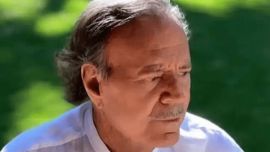








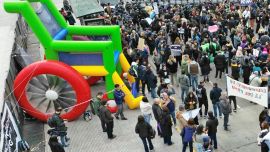
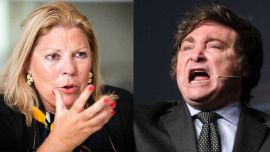
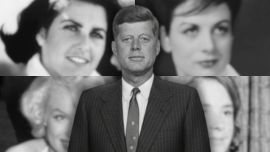
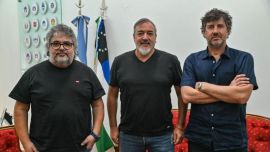

Comments